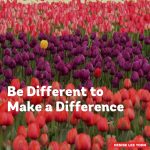Confectionary brands Hershey’s, Mars, and Sour Patch Kids have found innovative ways to leverage social and digital platforms to target new audiences and boost brand engagement.
Confectionary brands Hershey’s, Mars, and Sour Patch Kids have found innovative ways to leverage social and digital platforms to target new audiences and boost brand engagement.

“I have absolutely no regrets that I voted for Trump and that he’s our president right now,” says economist Diana Furchtgott-Roth, at right, in conversation with TED curator Chris Anderson, left, and Eliot A. Cohen at TED Dialogues, March 8, 2017, New York. Photo: Ryan Lash / TED
At TED HQ in New York on Wednesday, TED curator Chris Anderson moderated a lively conversation between Eliot A. Cohen, professor of strategic studies at Johns Hopkins University who served in the State Department during the George W. Bush administration, and Diana Furchtgott-Roth, an economist and Manhattan Institute Senior Fellow who held positions in the Ronald Reagan, George H.W. Bush, and George W. Bush administrations and was on the Trump campaign and transition team. Although Cohen and Furchtgott-Roth both consider themselves conservatives and agree that health care, climate change and terrorism are among the most important issues facing the country, they remain sharply divided on President Trump.
Character is destiny, says Cohen, borrowing a quote from Greek philosopher Heraclitus. And in Cohen’s opinion, Trump displays weaknesses in temperament and character that undermine his leadership. “Sooner or later, in every presidency, there comes a moment when he has to go into the Oval Office, sit behind the Resolute desk, and say, ‘I’ve decided to do something serious’ — usually involving the use of force — ‘and the reason I’m doing it is XYZ,’” says Cohen. “He has to be believed. And the people who didn’t vote for him, the 53%, will have to give him the benefit of the doubt.” Trump’s actions and statements, Cohen argues, seem to be “setting up for a situation in which the president does not deserve the benefit of the doubt.”
Trump’s economic policies are more important than character, contends Furchtgott-Roth. “I believe they’ll lead to economic growth that gets more young people into the workforce, reduces our debt, lowers taxes, brings more companies back to the US, gives us more school choice, and gets us more of the things we all want.” She singles out the president’s support of mandatory paid maternity leave, a pro-women measure and one usually favored by progressives. Even though some Americans may be displeased by Trump’s behavior, she points out, “People wanted something different. They wanted someone who gets up in the morning and tweets, who goes around to all his hotels.” But will his repeated attacks on the media work against him, Anderson asks? No, she says: “Many people who voted for President Trump like what he’s saying to and about the media, so he’s probably making himself more popular with them.”

“I was a big fan of Ronald Reagan and George W. Bush,” says professor Eliot A. Cohen, center. “And I don’t think they thought of our country as crippled and that our greatness was in the past.” TED curator Chris Anderson, at left, speaks with Cohen and Diana Furchtgott-Roth at TED Dialogues, March 8, 2017, New York. Photo: Ryan Lash / TED
Regardless, people dissenting with their political leaders is nothing new, according to Furchtgott-Roth. “Think of any politician you supported, and there will always be something he or she said with which you disagree,” she says. “I see the president as someone whose main function is to sign into legislation the bills that Congress sends him. Congress sent legislation to President Obama that he vetoed time after time, and I believe President Trump will sign into law what Congress sends, something that’s very important.”
It’s not Trump’s veto that worries Cohen; it’s that his authority, for now, rests upon a majority in Congress. “One thing that was very unfortunate about Obamacare is it was passed on a purely partisan basis, and I fear its replacement will be rammed through by the [Republican] majority,” he says. “The Civil Rights Act, Medicare, Medicaid — these were all bipartisan efforts, and if we’re to stabilize our domestic politics and deal with really big issues, it needs to be done in a bipartisan way. For that, you need leadership to be inclusive and to bring people together.”
Another concern: Trump’s approach to foreign relations. Calling for a tougher border policy is entirely reasonable, says Cohen. But the president’s initial immigration ban was “willfully cruel,” and saying that Mexico will pay for a wall between it and America could erode years of careful bridge-building policy between the nations. “We’ve been working for decades, Republican and Democratic administrations alike, to make this a close neighborly relationship,” says Cohen. And while Americans may applaud Trump for his brash tweets — or at least tolerate them — “President Xi Jinping [of China] may have less of a sense of a humor. Reckless statements could lead to conflicts.”
Like Trump or not, we all owe him a chance, says Furchtgott-Roth. “We tried eight years of president Obama, and it didn’t get us the results we need, especially in states where people are really hurting. That’s why people elected Trump — they didn’t want another four years of the same.” And no matter the length of his time in office, politics is cyclical. “Sooner or later, the other side will come back,” says Cohen. He references Johnny Cash’s song “This Old Wheel” — its lyrics go “That old wheel is gonna roll around once more / When it does it will even up the score.” Posing one final rhetorical question to President Trump, Cohen wonders, “Do you want to make any effort to unify the country and find some bipartisan consensus?” Now that would truly be something different.
In this webinar, Vikki Rohrer, Global Agency Finance manager – Ford Motor Company hared how they were able to simplify the Agency Performance Evaluation process to deliver one integrated comprehensive assessment per region.
The first Marine Corps commercial without “The Few, The Proud”
“Battles aren’t won solely on the field
That’s a common misconception
Battles are won within
Over enemies of fear
Enemies of doubt
In that place where promises are kept
Promises to oneself
Promises to one’s community
Promises to one’s country
In the heart of every Marine
You’ll find a promise
A promise forever kept
A promise of Battles Won”
CREATIVE CREDITS:
Ad Agency: JWT
(adsbygoogle = window.adsbygoogle || []).push({}); –ADVERTISEMENT–
He candidly shared with 60 Minutes correspondent, Bill Whitaker, his reaction to the news:
“I can’t wrap my mind around training somebody to take my position. You know, it’s my livelihood. How am I supposed to feel?”
As Whitaker reported, Harrison was one of about 80 IT workers at the UCSF Medical Center who found out they would be replaced by younger, less costly foreign workers.
Whitaker interviewed former Congressman Bruce Morrison, who in 1990 wrote the legislation creating the H-1B Visa. But as Morrison points out, the bill was only meant to allow U.S. companies to fill job shortages with skilled foreigners, if they couldn’t find qualified American workers. But he told Whitaker:
“I’m outraged. The H-1B has been hijacked as the main highway to bring people from abroad and displace Americans.”
Morrison went on to say:
“The workers being brought in don’t know anything more than the workers they’re replacing. They know less. And that’s why they have to be re-trained or trained by the American workers being laid off. This is not about skills. This is about cost.”
To find out more about the loophole in the law that permits this practice and the toll its taking on American workers faced with training their replacements, watch the March 19th edition of 60 Minutes.
The post Are U.S. jobs vulnerable to workers with H-1B visas? appeared first on The Good For You Network.
Meet the co-creator of Siri, the founder of the world’s largest hedge fund, a Nobel-winning researcher who helped discover how we age, the head of the World Bank, and one of the greatest athletes of all time. We’re thrilled to announce the speaker lineup for TED2017, with a mix of illustrious names and the up-and-coming minds who are creating the future.
TED2017 is a week to explore the most powerful ideas of our time. In these mainstage sessions (including one in Spanish) we’ll ask – and try to answer – the big questions of the moment. This year’s TED will take on the hard political topics that are unavoidable in this turbulent era — and also look within, to the qualities that can make us into better people, and make our world a better place to be. And throughout the upcoming year, we’ll be making these mainstage talks into online TED Talks, sharing them free with the world.
Wherever you are: You can watch Session 1 (Monday night) and Session 4 (Tuesday night) live in cinemas, thanks to the TED Cinema Experience. Can’t make it to the movies on a weekday evening? On the weekend after TED2017 wraps, you can watch a best-of compilation — 90 minutes of the best moments from the week at TED — as a special weekend matinee. Click here to find the cinema closest to you.
Por primera vez, la conferencia de TED en Vancouver presentará un bloque entero de charlas TED en español — una programación que sentimos que merece una celebración! Para celebrarlo, vamos a compartir este bloque por transmisión en vivo de manera abierta y gratuita en live.ted.com el martes, 25 de abril, desde las 2:15 pm y hasta las 4:00 hora de Vancouver.
La temática del bloque en español será “Conexión y sentido” y contará con seis oradores de diversas disciplinas y orígenes. Entre ellos se encuentra el artista Tomás Saraceno (Argentina/Alemania), el músico Jorge Drexler (Uruguay/España), la ex candidata presidential y activista por la paz Ingrid Betancourt (Colombia/Francia/Reino Unido), la primatóloga Isabel Behncke Izquierdo (Chile/Estados Unidos), la astrofísica Gabriela Gonzalez (Argentina/Estados Unidos) y el periodista y presentador Jorge Ramos (México/Estados Unidos).
El bloque marca el lanzamiento oficial de TED en Español, una iniciativa de TED diseñada para desarrollar contenido y comunidad en el mundo de habla hispana. El equipo de TED en Español ya ha estado trabajando seleccionando contenido en español y comenzando a compartirlo a través de varios canales que incluyen:
· Un boletín semanal por correo electrónico
· Cuentas de Facebook y Twitter
…y más de 2,000 charlas TED con subtítulos en Español.
Los clubes TED-Ed ya se están haciendo también en español, y los usuarios móviles ahora se pueden instalar una versión en español de la aplicación TED para iOS y Android.
TED también tiene planes para traer nuevos socios para apoyar a TED en Español y para desarrollar contratos de distribución para el contenido en español. Antes de fin de año, realizaremos un evento en español en nuestro teatro de la oficina de TED en Nueva York.
“El Mundo de habla hispana constituye una parte importante de la audiencia global de TED,” dijo Gerry Garbulsky, el director de TED en Español. “Al expandir nuestro enfoque a otros idiomas, descubriremos nuevas ideas y nos equiparemos mejor para compartirlas con una audiencia más amplia.”
Brand differentiation is more important now than ever before. You can’t just be better than your competitors — you must be different. Here are five of my resources, all in one handy spot, to help you understand the new challenges and requirements to differentiate and how to achieve greater brand differentiation.
If you want to stand out from the sea of sameness in your category, your brand must be different. Simply being better than your competitors no longer creates a sustainable advantage in today’s competitive business environment. Learn three strategies to make your brand stand out and gain an competitive advantage in this new video.
Don’t Settle for Being an “-er Brand”
 Red flags go up whenever I hear a pitch that explains how a new offering is just like another but is small-er, bigg-er, thinn-er, light-er, fast-er, sexi-er, whatev-er. Hearing “we’re just like X brand but we’re…” sets off warning signals about breakthrough ability and long-term viability. Learn why an -er position is a dangerous one to adopt in this HBR.org article.
Red flags go up whenever I hear a pitch that explains how a new offering is just like another but is small-er, bigg-er, thinn-er, light-er, fast-er, sexi-er, whatev-er. Hearing “we’re just like X brand but we’re…” sets off warning signals about breakthrough ability and long-term viability. Learn why an -er position is a dangerous one to adopt in this HBR.org article.
Be Different to Make a Difference

If you want to build a great brand, you would do well to focus on being different. But your difference must make a difference. You can’t be different just for the sake of being different. Great brands are built on meaningful differentiation. To be meaningful, your differentiation needs to be polarizing, transcendent, and substantive. Read more in this guest post on the Bulldog Drummond blog.
How To Determine Your Key Brand Differentiators
 A brand differentiator is a unique feature, aspect, and/or benefit of your product or service that sets it apart from competing brands. A single differentiator or a robust set of them form the basis for how you establish competitive advantage. Take three steps to identify your key differentiators in this blog post.
A brand differentiator is a unique feature, aspect, and/or benefit of your product or service that sets it apart from competing brands. A single differentiator or a robust set of them form the basis for how you establish competitive advantage. Take three steps to identify your key differentiators in this blog post.
A Great Customer Experience Isn’t Enough
 To establish your customer experience as a true competitive advantage, it must be distinctive — it must be noticeable, valuable, and memorable to customers. Good, generic customer experiences will soon simply define the playing field. Differentiation will be how brands win. Learn from Westin Hotel & Resorts and PIRCH in this guest post on the CX Journey blog.
To establish your customer experience as a true competitive advantage, it must be distinctive — it must be noticeable, valuable, and memorable to customers. Good, generic customer experiences will soon simply define the playing field. Differentiation will be how brands win. Learn from Westin Hotel & Resorts and PIRCH in this guest post on the CX Journey blog.
Don’t miss out on my future postings about Brand Differentiation. Sign-up for my e-newsletter, subscribe to my feed, , or follow me on Twitter.
The post brand differentiation appeared first on Denise Lee Yohn.
In order to maintain a strong presence, marketers need to use a consistent and well-defined brand voice.
Today, we’re excited to bring the world of TED Talks further into your home with the new TED Talks skill for Amazon Alexa! Available on devices with Amazon Alexa including the Echo and Echo Dot, TED fans can now listen to the latest ideas from the world’s greatest thinkers by voice command.
For existing Alexa users, enable the skill by saying “Alexa, enable TED Talks skill,” or go directly to the TED Talks skill page and click “enable skill.”
Once you’ve opened the TED Talks skill, ask Alexa to play talks about your favorite topics — from robots and space to design and mindfulness. Want to listen to the latest talk? Simply command, “Alexa, ask TED Talks for the latest talk.”
Whether you’re a multi-tasker who wants to learn about virtual reality while folding laundry, a parent needing a talk to distract a child during dinner or just a curious individual who wants to stay inspired without too much effort, Alexa can now provide you with a great idea with ease. Ask her things like, “Alexa, ask TED Talks for something funny,” and start listening.
Enable the TED Talks skill on Amazon or simply say, “Alexa, enable TED Talks skill,” to start listening to TED!